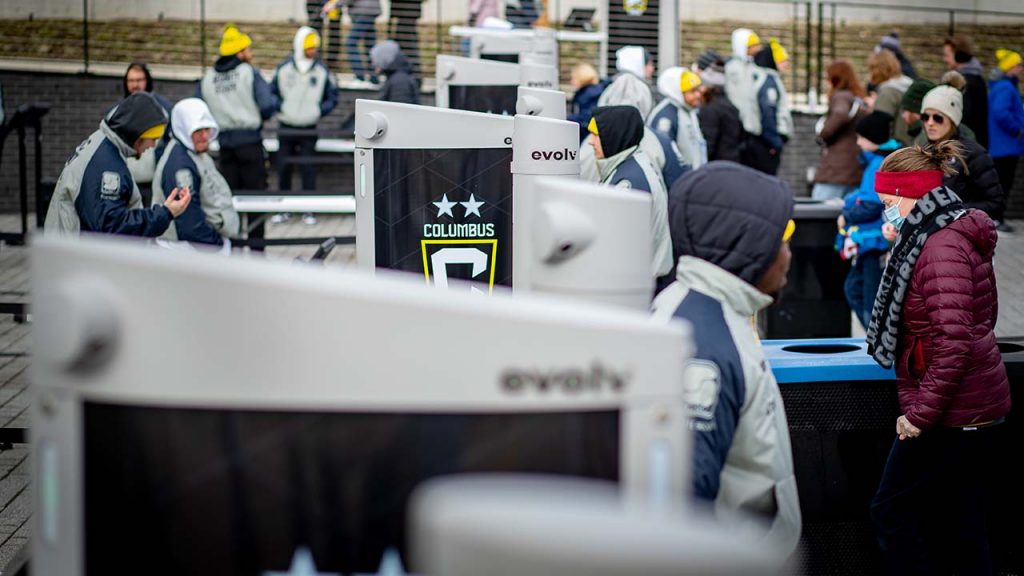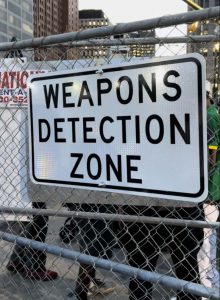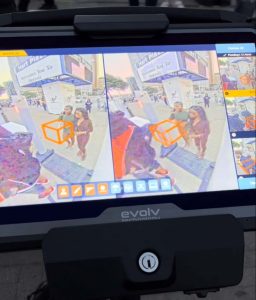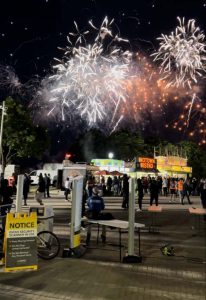Cities like Detroit turn to new weapons detection tech to try to prevent gun violence
In Detroit, city leaders hope the technology can be used to cut down on gun violence as they bring security checkpoints to public spaces.

The Evolv system is seen at Lower Field in Columbus, Ohio.
This story originally aired on Marketplace.
Weapons detection screening systems are popping up in many places — think metal detectors 2.0. Disney World and Six Flags have them, and more and more school districts screen students through one every day as they enter school.
In Detroit, city leaders hope the technology can be used to cut down on gun violence as they bring security checkpoints to public spaces. As part of the city’s celebrations around the Fourth of July, crowds of people headed to the riverfront to get a good view of the annual fireworks show. It was the first one since the pandemic started and thousands showed up to watch from both Detroit and its surrounding suburbs.
The spectacle brought Tony Semenuk down to watch. Up until this year, the St. Clair Shores, Michigan, resident had been hesitant to attend.
“Every year that you come down here, they light fireworks off and you don’t know if they’re gunshots,” he said. “This is the first time I’ve been down here in six years.”
Semenuk noted the big difference at the fireworks show this year — the Detroit Police Department sectioned off the best place to watch the fireworks and created a temporary “weapons detection zone.”

Before people entered, they had to go through a weapons detection checkpoint. There were rows of gates with little cameras on them as people walk past to be screened. Taliyah Brown was there working for a private security company hired to manage the system for the fireworks. She monitored a tablet to see if it flagged anyone.
“This is my first working these,” Brown said. “But I’m good with technology.”
Most people flowed through without a problem; there were hardly any lines. But the system flagged plenty of spectators. Brown pointed to an alert on her tablet — it’s a video loop that shows an orange box appearing on someone’s wagon passing through. That meant there could be weapons.
“As you can see, it set it off, one, two, three, all in the same area,” said Brown, pointing to the video on her tablet.
Brown did her own search and didn’t find anything, but she did see some metal folding chairs on the wagon. “The chairs go off, period,” she said, explaining that the metal chairs had caused false alarms all day.
But other times, Brown said the weapons detection system works well. Moments later, Lulu Ghannam walked through the checkpoint and was flagged. She was asked by security and then police to step aside. She had a firearm in her purse.

“I’m a state trooper. I work the road. I have to carry it off duty,” said Ghannam after the security team let her go. “We need everyone to feel safe and secure, and if that’s what’s going to get us there, then that’s a great thing to have.”
Earlier this year, Detroit paid more than $1.3 million to a Massachusetts-based company called Evolv Technology for the weapons detection gates. Officials say the technology allows 3,600 people to go through these checkpoints every hour.
“That’s one person a second,” said Evolv co-founder Mike Ellenbogen. “We want to make the system red-light, green-light simple.”
Evolv gates use magnetic field sensors to screen and categorize objects, Ellenbogen said. But it’s not 100% accurate, as the system’s artificial intelligence sometimes confuses some everyday items for threats.
“In the event of a piece of tubular steel, that could be a gun barrel or it could be the leg of a folding chair,” Ellenbogen said.
Related: Tracked and Traced: Reporting on surveillance in Detroit

Still, business has been good. The company is steadily growing its list of subscribers. Thousands of Evolv gates are used at museums, schools and stadiums across the country.
In Detroit, Mayor Mike Duggan said earlier this year at a policy conference that he wants to use the checkpoints outside social gatherings like nightclubs and block parties.
“We don’t want to arrest you,” Duggan said. “We’re telling you ahead of time it’s going to be there. Leave your gun at home.”
By the end of the fireworks show, the Detroit Police Department arrested four people for carrying concealed weapons.
While some in the city are concerned about increased surveillance, others say they like the new technology. Demetrius Jackson lives near where the firework show was held. He said he doesn’t make a habit of going outside in large crowds but decided to attend the fireworks.
“Usually, there wasn’t that much security down here,” Jackson said. “Now, there’s enough security, and I don’t think nothing can really go bad.”
Top photo credit: Evolv Technology
Trusted, accurate, up-to-date.
WDET strives to make our journalism accessible to everyone. As a public media institution, we maintain our journalistic integrity through independent support from readers like you. If you value WDET as your source of news, music and conversation, please make a gift today.
